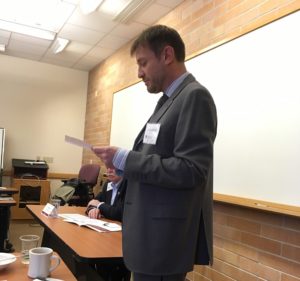
Lorenzo Patelli
For 10 years, the Institute for Enterprise Ethics has provided an invaluable forum for varied insights on the gray areas of the business world.
In mid-August, the Business Roundtable, an association comprised of the chief executive officers of some of the leading companies in the U.S., sent a message across corporate America to emphasize a commitment to all stakeholders, not just shareholders. Part of the statement reads:
“While each of our individual companies serves its own corporate purpose, we share a fundamental commitment to all of our stakeholders. … Each of our stakeholders [customers, employees, suppliers, communities and shareholders] is essential. We commit to deliver value to all of them, for the future success of our companies, our communities and our country.”
While some may fret over the fresh view on a business’s purpose—and the demotion of shareholders from the highest rung on the corporate ladder—Daniels Associate Professor Lorenzo Patelli took it in stride. He was in the midst of finalizing the 2019–20 schedule for roundtable discussions for the Institute for Enterprise Ethics (IEE), including a special three-session series on the source of purpose in business.
“The Business Roundtable’s statement was a huge change as it represented a much more inclusive approach to the purpose of a corporation,” said Patelli, the IEE interim director. “But we were already planning this series around the objective to go deeper into where this sense of purpose comes from and is purpose ethical. It’s proven to be very topical.”
Since its founding at the University of Denver 10 years ago, the IEE has been delving into such issues through regular roundtable sessions that engage business leaders alongside Daniels College of Business faculty, researchers and students. The robust discussions, which are hosted by Daniels, allow for a respectful exchange on ethical matters that thrive in the sizeable gray area between right and wrong.
“At times, it’s important to balance the carrot and the stick,” said Paula Gable, an independent consultant and founder of Conscious Capitalism Denver Chapter. “Some emphasize the compliance aspect of a situation, and I see that as the stick. The carrot is more about feeling good about going to work and knowing you’re having a positive impact on the community, the lives of your employees and shareholders, and the planet.”
Along with two dozen other individuals, Gable attended an IEE session at Joy Burns Center on Nov. 5 that explored the ethics of public-private partnerships. Led by Tim O’Brien, auditor of the City and County of Denver, the nearly two-hour discussion focused heavily on recent developments such as the beleaguered Great Hall renovation project at Denver International Airport and the unsolicited bid for the E-470 tollway.
Prodded by O’Brien, attendees shared expertise, questioned different viewpoints and weighed the ethical responsibilities of governments, corporations and the public.

Panelists at the Nov. 5 roundtable discussion.
“Ethics are complicated and complex—a cultural dimension of the way people lead, behave and act, which is constantly evolving,” Patelli said. “At the same time, ethics is a skill that can be further improved and must be adapted to the evolving environment.”
Milena Zilo (BSBA 2005), a frequent attendee and supporter of the IEE, added that increased awareness of ethical matters in today’s hyper-connected society makes knowledge and consideration of lapses—and their impacts—essential for corporations.
“In the past, when problems came up, companies were more likely to downplay or deflect questions about the situation,” said Zilo, who spent nearly a decade on Wall Street before founding Zilo International Group, a management consulting firm, in Colorado in 2014. “Nowadays, organizations are promoting a culture of accountability and transparency and taking a conscious and long-term approach in correcting their actions. Corporations are moving more toward purpose-driven vs. process-driven cultures and that aligns with what employees, shareholders, clients and partners want.”
To that end, Micah Feigelson, another IEE regular who’s also a first-year Daniels MBA student, said he values the breadth of perspectives at the roundtables.
“You can see how these business leaders think and gauge your opinion from them,” he said. “It’s broadened my perspective to see how companies have acted in response to an issue, or pushed back on it.”
Just as importantly, all of the professionals in the room, no matter how seasoned or experienced, similarly benefit from the constructive back-and-forth.
“I believe that you’re never done in training, educating and practicing ethics at both the professional level and the organizational level,” Patelli said.
Following a break for the holidays, the IEE schedule will pick back up with roundtables scheduled monthly from February through May.
